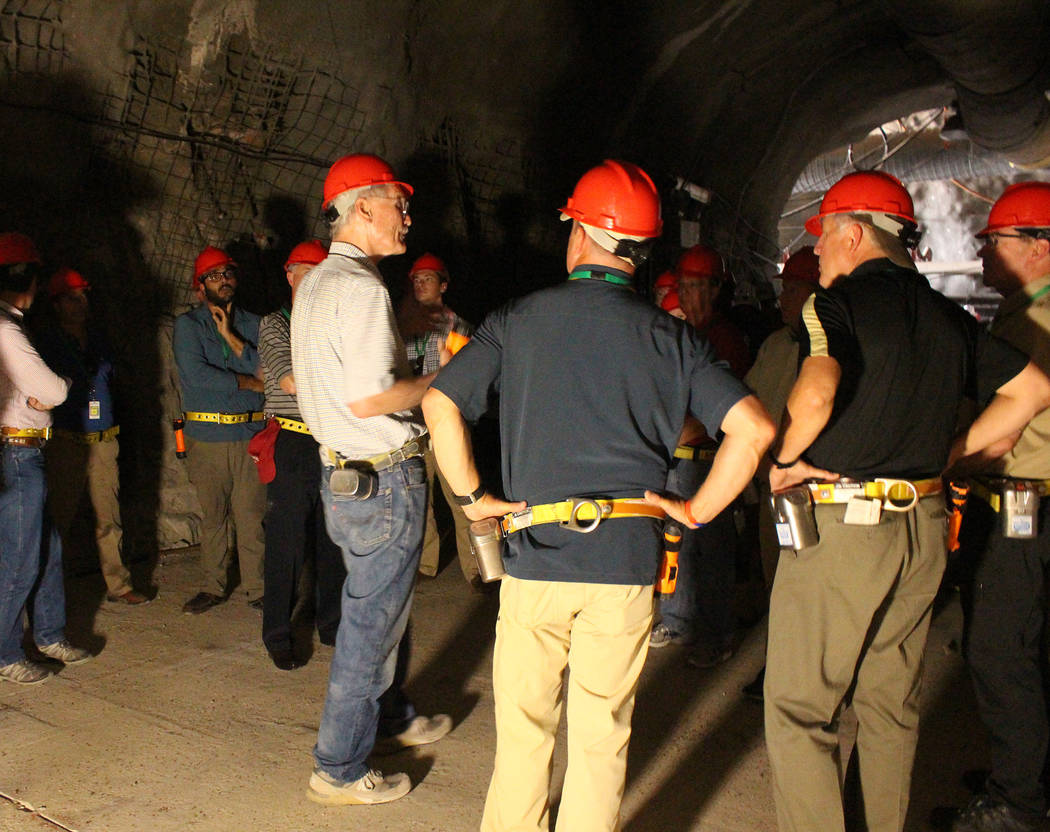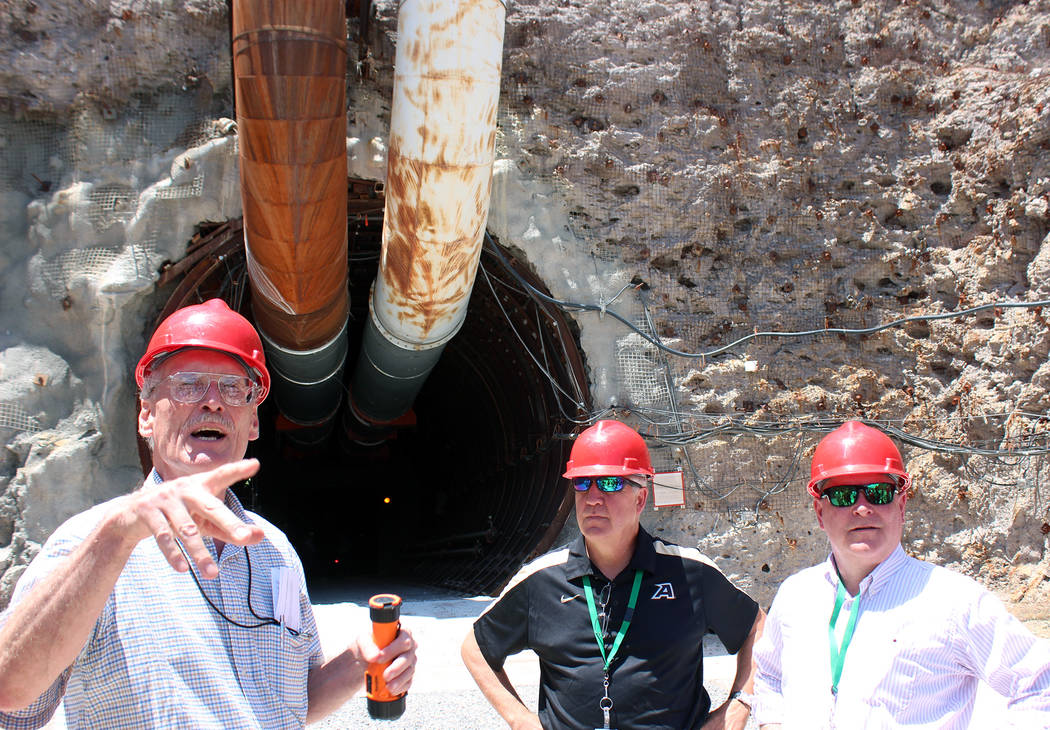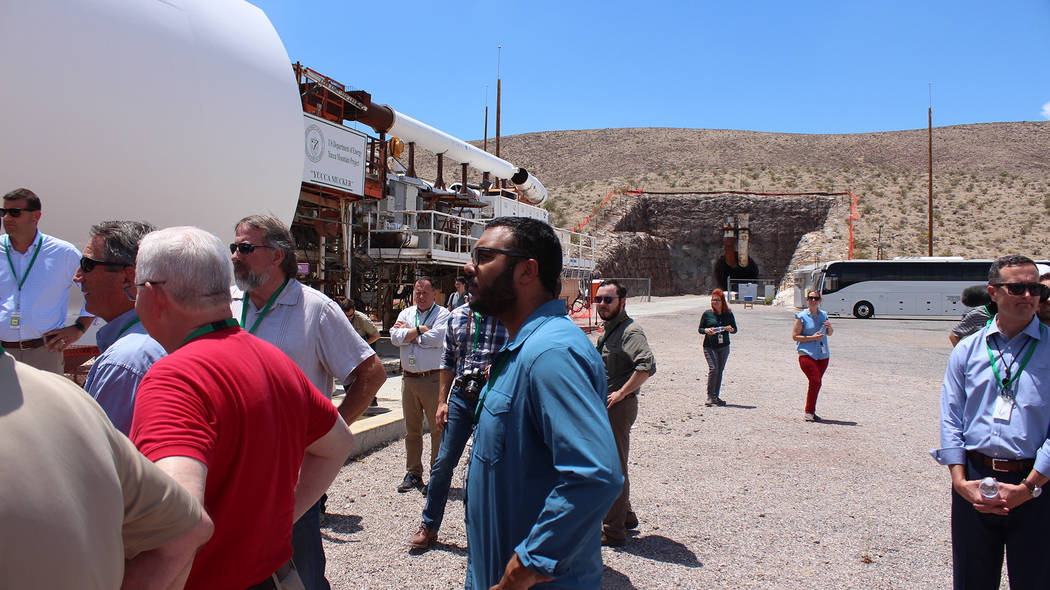Federal lawmakers push for Yucca Mountain
Federal lawmakers from across the country made their way to Nye County to tour one of the area’s most debated developments of this century, and part of the preceding one: Yucca Mountain.
A dozen congressmen, all in support of making Yucca Mountain the nation’s repository for high-level nuclear waste, suited up with red-colored hard hats and other safety equipment for a tour down an illuminated portion of a 5-mile-long exploratory tunnel on Saturday.
The tour was led by U.S. Department of Energy officials, combined with members of the media, congressional staffers and others.
All made their way down the uneven path filled with railroad ties and accompanying tracks in the tunnel.
William Boyle, U.S. Department of Energy geologist, who led the congressional tour, said the tunnel has been empty for 20 years. The Energy Department announced completion of drilling the exploratory tunnel in April 1997.
Rep. John Shimkus, R-Ill, along with 11 other congressmen, are pushing for the switch to be turned on at Yucca permanently and bring radioactive waste to the site. The Illinois congressman also led a tour of several lawmakers in 2015 to Yucca Mountain.
Legislation
Shimkus, chairman of the House Energy and Commerce Committee’s environment subcommittee, sponsored a bill known as the Nuclear Waste Policy Amendments Act (H.R. 3053), which called for streamlining the licensing process on the Energy Department’s application to build a repository for the storage of the nation’s nuclear waste.
The House’s bipartisan legislation passed the House 340-72 in May. The legislation is awaiting action in the Senate.
If the Senate was to pass the legislation, Yucca Mountain would be one step closer to receiving radioactive nuclear waste from 121 different sites, across 39 states.
Nevada opposition
The majority of Nevada’s federal lawmakers oppose opening Yucca Mountain to nuclear waste.
U.S. Nevada Sen. Dean Heller said in a news release that “Americans shouldn’t have to pay for his (Shimkus’) congressional vacation to Las Vegas. His legislation is going nowhere and despite repeated attempts to fund Yucca Mountain in the House of Representatives, I’ve killed their efforts each and every time.”
Rep. Dina Titus, D-Nev., also called out Shimkus on his taxpayer-funded trip.
Rep. Jacky Rosen, D-Nev., called the tour a “political stunt.”
Rosen and Titus, along with Rep. Ruben Kihuen, D-Nev., were all invited to the tour; all declined.
Nevada’s federal regulators are fighting to keep the waste out of the state from bipartisan action in the House and action by President Donald Trump, who has pushed several times for funding to restart the licensing process for Yucca Mountain.
Shimkus called Nevada’s federal representatives colleagues and friends and said he has “respect for their opposition,” during a press conference at the end of the tour.
“But Nevada is one state out of 50,” he added.
Shimkus pointed to his bipartisan support in the House from both Republicans and Democrats.
“My goal is to bring my colleagues out here to see the site, talk to the people who have been involved with it for years, understand the science,” Shimkus said during the press conference following the tour. “It’s kind of self-explanatory when you travel out here and see the remoteness, and what’s been done so we can move forward.”
Testing
During the tour at the site, lawmakers were told about tests done at the site in the past. One of those tests was to prove Yucca Mountain’s water tightness, where drip irrigators were used.
“This is pretty much the only place in Yucca Mountain where we had dripping water,” he said. “And we caused it.”
The conclusion of the experiment was that Yucca Mountain was not completely watertight.
“Yucca Mountain isn’t watertight,” he said. “We couldn’t make it watertight if we wanted to.”
In response to a question about how Yucca would react to heat given off by nuclear waste, Boyle responded with the results of another past test which included heating rock in the walls to 200 degrees Celsius for four years.
According to Boyle, in the end, the water inside the rock turned to steam and was released as condensation.
The potential repository site sits some 95 miles from northwest of Las Vegas, though it sits much closer in proximity to towns such as Pahrump, Beatty and Amargosa Valley, which houses about 1,500 residents, according to a report by Nye County in 2009.
Boyle said Amargosa Valley was the closest town to the site of the potential repository.
“If we’re not at the end of the universe, we’re awful close,” he said.
Local politicians and other debates
Some local county leaders have been advocates of the proposed move such as Nye County Commissioner Dan Schinhofen, an avid supporter of Yucca Mountain who lost his re-election bid in the District 5 race during the June primaries.
His future replacement, Debra Strickland, said in an interview with a reporter from the Pahrump Valley Times that “she wants to see more science on Yucca Mountain before she can support the project.”
“The science is 10 years old on Yucca Mountain, and I would like to see some more recent science,” she said in a June phone interview with the Times.
The battle has gone on in the county for years with some proponents saying it would bring jobs and other things such as infrastructure development.
Opponents of the project have noted that the site is prone to things such as volcanoes and earthquakes—making it not ideal for nuclear waste storage.
Rep. Greg Walden, R-Oregon, chairman of the House Energy and Commerce Committee, told reporters during a press conference that he was confident that the nuclear waste at the Yucca Mountain site would be safe there.
The lawmaker also talked about nuclear waste in the Pacific Northwest, specifically Hanford Nuclear Reservation in Washington state, which was a plutonium processing plant used during World War II to create the atomic bomb used on Nagasaki, Japan.
The waste from that plant will eventually need a place to come to, Walden said.
“A million years, here,” he said. “We know the science shows it can be put here safely.”
Other lawmakers chimed in their belief of the safety of putting nuclear waste in the state during the visit.
Hearings by the House on Yucca Mountain have featured testimony from scientists and engineers, who said storing nuclear waste at Yucca Mountain would be safe, according to a report in the Las Vegas Review-Journal. One of those persons that testified estimated that waste could be stored at Yucca Mountain for one million years without having an issue, the report stated.
Texas Republican Joe Barton, vice chairman of the House Energy and Commerce Committee, said he agrees that the science works out but added another element to the conversation.
“What strikes me about the project, the science works out, the technical merit works out here,” he said. “What doesn’t work is the politics.”
Barton added that he believed the political fight is the fault of Congress.
“We forced Nevada to take this. In my opinion, if we’ve done it a little bit differently, we wouldn’t have the political fight over this,” he said.
In the recent legislation passed in May by the House, Barton said that things have been done differently with the process on interim storage under the new bill.
“We allow and require the states to precertify that they’re going to accept the interim storage,” he said. “We set up a competitive model, so that any state that doesn’t want to participate doesn’t have to.”
Barton continued saying that “If we had done that from the get-go on the high-level waste, we probably would have a repository. It probably would be here.”
Contact reporter Jeffrey Meehan at jmeehan@pvtimes.com


















